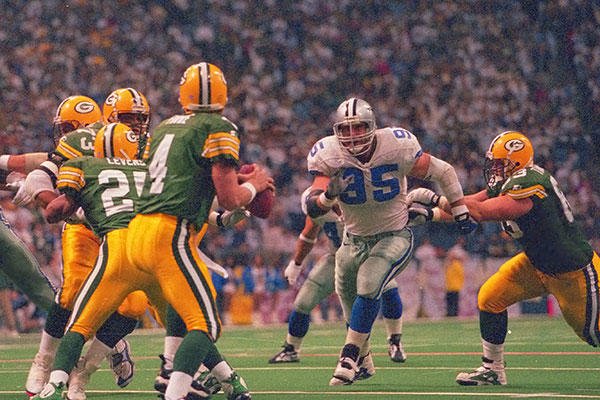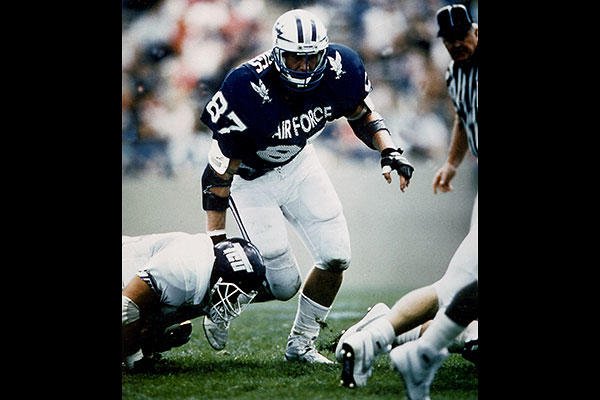FORT GEORGE G. MEADE, Md. — Super Bowl 50 is just days away and it's hard not to wonder how one of the U.S. Air Force Academy's best all-time players fits into that history.
Chad Hennings won three Super Bowls with the Dallas Cowboys during the 1990s, and his first appearance was within a year's time of flying his A-10 Thunderbolt II in a combat sortie in northern Iraq.
Hennings, a 1988 Academy graduate, led the nation with 24 sacks and was awarded the Outland Trophy during the 1987 season — an award that recognizes the nation's best interior lineman.
Committed to Serve
Following graduation, Hennings — now a member of the College Football Hall of Fame — was drafted by the Cowboys in the 11th round of the 1988 draft. Before he could even suit up in the NFL, Hennings had to first fulfill his military commitment, a move that was initially hard to accept.
"I wouldn't say there were regrets, (but) it was an emotional struggle because I wanted to be able to compete," Hennings said.
From a character perspective, he knew without a doubt what he needed to do because he made a commitment and he was going to stick to it. The drive to compete, however, made his transition from school to pilot training and then into his active-duty squadron a difficult one. That void would eventually be filled with friendly competition as an A-10 pilot.
"We did compete on the range; we competed for performance," he said. "There (was) always competition and it was a healthy competition."
After pilot school, Hennings was stationed in the U.K. and deployed twice to Incirlik Air Base, Turkey, in 1991 and 1992. While deployed, he flew 45 combat sorties in northern Iraq in support of Operation Provide Comfort, an international relief effort after the Gulf War.
After getting settled into the Air Force, Hennings said he contemplated making a career out of it.
"Football was a distant memory and something in the past that I never really thought about until the Air Force went through the reduction in force and they started the waivers in the spring of '92," he said.
Pro Player
Hennings separated from active-duty Air Force in April 1992 and transitioned to the Air Force Reserve. He continued to serve in the Reserve individual mobilization augmentee program for almost 10 years.
The next month, Hennings found himself in Dallas working out for the Cowboys.
"It was extremely stressful, initially transitioning in '92, because I'm leaving one career for another," he said. "I'm moving from one continent to another, taking on a whole new different position. There were a lot of just stress factors there, and it wasn't assured that I would make the team."
Hennings said it was tough coming into the league and competing at a level of competition that was much higher than he experienced before.
But all the downtime spent in the weight room and working out when he wasn't flying during his deployments and TDYs paid off. He would go on to secure a spot on the team, and kick off what would eventually be a nine-year career with the Cowboys, playing in 119 games and recording 27.5 sacks.
In his first season, Hennings and the Cowboys would go on to beat the Buffalo Bills in Super Bowl 27.
"It was pretty surreal," he said. "I essentially flew a combat mission and then played in the Super Bowl all within a year's time."
He compared that Super Bowl experience to his first combat mission. He said he knew he had a job to do, and being around a set of guys who were experienced made it easier to navigate and process all of his emotions.
During his next three seasons, Hennings would go onto win two more Super Bowls with the Cowboys.
"You got to a point in our culture of being a Dallas Cowboy, that that's what was expected. We knew we were the best team out there,"
Hennings said. "I kind of compare that analogy to being a fighter pilot. It's kind of that confident arrogance, where you know you're good, you know your abilities; you walk out there, you don't flaunt it, but you walk with an extreme amount of confidence."
It wasn't until the latter part of Hennings' career that he fully appreciated winning three Super Bowls, he said.
Two decades after he appeared in his last Super Bowl, beating the Pittsburgh Steelers in Super Bowl 30, Hennings has a sincere admiration for those moments in time and truly appreciates how special those teams really were.
"As a kid growing up, all your heroes, the role models that you looked up to on the gridiron — you know those guys — they were able to hold that trophy up," Hennings said. "I was a Minnesota Vikings fan, so they went there four years and they never won one, and that's where I realized too how difficult it is, not only to just get to the Super Bowl, but to win one — how truly special that is."
Hennings said one of the best memories is from Super Bowl 30, where he recorded two sacks — a Super Bowl record that he shared with several other players before it was broken the next year.
Humble Beginnings
Being a solid performer on the gridiron and in his jet, Hennings has always tried to strive for excellence.
Growing up in Elberon, Iowa, Hennings would sometimes put in 12-plus-hour days helping his father and grandfather on their farm, where they predominately raised corn and a feedlot operation for cattle. He'd help wherever needed, whether feeding the cattle, bailing hay, driving tractors, or performing maintenance.
"The work ethic came from watching my father, my grandfather, but a lot of it I can attribute it to my older brother, who really pushed me to workout with him," he said.
Hennings' older brother, Todd, was a couple years older and was the quarterback for their high school football team. Hennings said he was a tight end, and he recalled his brother dragging him off to run routes and lift weights.
"When I started to see the success of all the hard work that I put in, then it became more of a self-driving motivation than having somebody externally motivate me," he said.
That motivation to be a better player and better person carried over when it was time to attend college. Hennings had several scholarships, but said he wanted a "holistic experience." He yearned to be challenged academically and wanted to have the experiences a typical college graduate wouldn't have.
Looking back, the leadership skills gained, the experience of flying jets, and the camaraderie within his fighter squadron are things that gave him skills he used on the gridiron and in his everyday life.
"You know, it all worked out great," Hennings said. "I had an experience flying that I would never trade. If I had to do it all over again, I would do it exactly the same."
Where He is Now
Today, Hennings lives outside of Dallas, where he's a partner in a commercial real estate company and does a lot of public speaking, which he said is his way of giving back.
"That's my passion now in this last half of my life, is to be an evangelist, in essence, for that aspect of a need of character in our community and for us as individuals," Hennings said.
An author of three books, he's also married with two children, who are both in college.





























